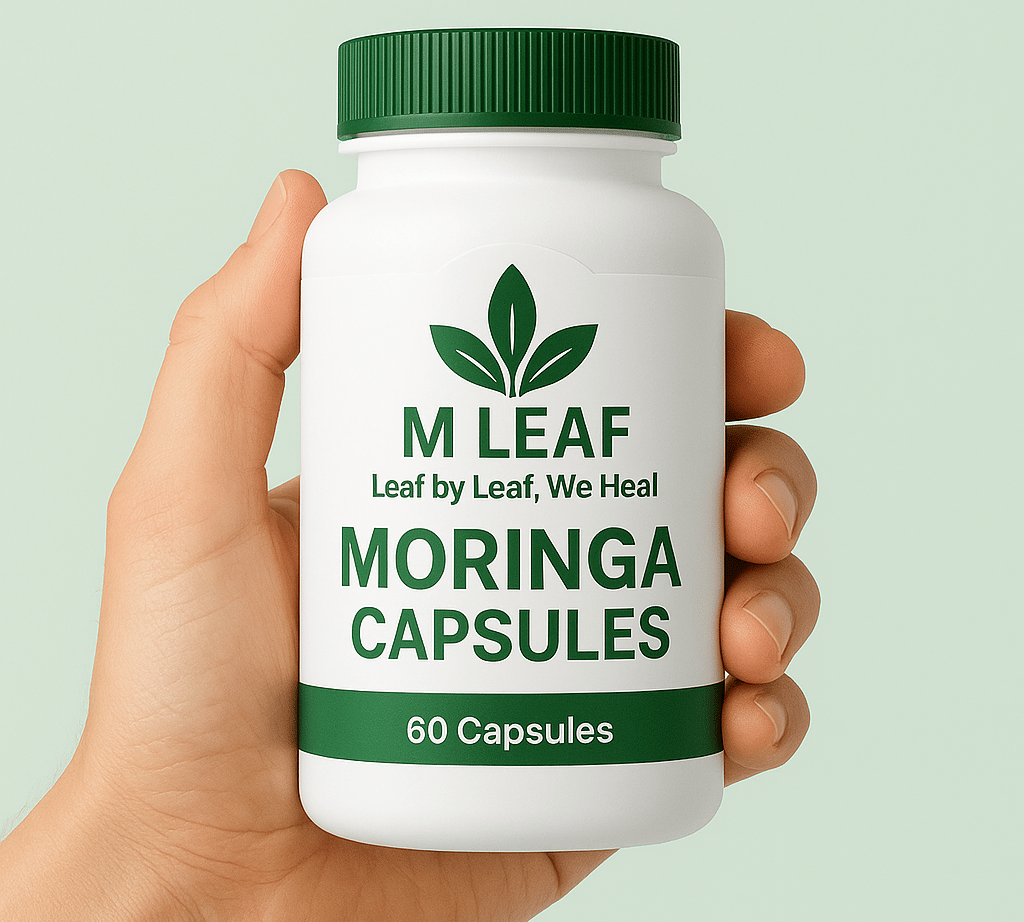Moringa Capsules: Benefits & Side Effects Explained
Discover the health benefits of moringa capsules, including their uses and potential side effects. Learn how these powerful supplements can enhance your wellness routine and what to watch out for.
10/4/20257 min read


Introduction to Moringa
Moringa, commonly known as the “drumstick tree” or “miracle tree,” is scientifically referred to as Moringa oleifera. This versatile tree finds its origins in the foothills of the Himalayas, particularly in India, but it is now cultivated in many tropical and subtropical regions across the globe. Moringa is highly valued for its nutrient-rich leaves, pods, and seeds, which have been used traditionally for centuries in various cultures as a source of food and medicine.
In traditional medicine, particularly within Ayurveda, moringa has been employed to address a multitude of health issues, including inflammation, digestive disorders, and nutritional deficiencies. Its leaves, rich in vitamins, minerals, and essential amino acids, have contributed to its reputation as a natural remedy for a range of ailments. Additionally, moringa’s oil extracted from its seeds is often used for cooking and skin care, highlighting its multifaceted applications in daily life.
Over recent years, the popularity of moringa capsules as a dietary supplement has surged. This rise can be attributed to the growing awareness of its numerous health benefits, which include antioxidant properties, potential anti-inflammatory effects, and its role in blood sugar regulation. As people increasingly seek convenient ways to incorporate superfoods into their routines, moringa capsules have emerged as an accessible option that allows individuals to benefit from this extraordinary plant without the need for extensive preparation or cooking.
The global interest in moringa reflects a broader trend towards natural health and wellness solutions, as consumers look for alternatives to synthetic supplements. Understanding the significance of moringa in various cultures and its transition to modern supplement forms is essential for appreciating its widespread appeal and inherent benefits.
Health Benefits of Moringa Capsules
Moringa capsules have gained considerable attention due to their extensive health benefits, founded on a rich nutritional profile that includes a variety of vitamins, minerals, and antioxidants. Moringa oleifera, commonly known as the drumstick tree, is revered for its remarkable ability to nourish and support overall well-being. A notable aspect of moringa capsules is their high concentration of vitamin C, calcium, potassium, and iron, which are essential nutrients that contribute to various physiological functions.
One of the prominent advantages of moringa capsules is their anti-inflammatory properties. Scientific studies indicate that the compounds found in moringa, such as isothiocyanates, possess the ability to combat inflammation effectively. Chronic inflammation is linked to numerous diseases, including arthritis and cardiovascular conditions, making moringa an appealing natural remedy for those seeking relief and support in managing such ailments.
Additionally, moringa capsules have been shown to have a positive effect on blood sugar levels. Research suggests that the consumption of moringa may help to regulate blood sugar, making it a potential adjunct in managing diabetes. The ability of moringa to enhance insulin sensitivity and improve glucose tolerance is supported by scientific findings, offering promise for individuals dealing with blood sugar fluctuations.
Another remarkable benefit of moringa capsules is their role in improving digestion. Moringa is known to have high fiber content, which can aid in promoting healthy bowel movements and alleviating constipation. Its natural digestive enzymes may also enhance nutrient absorption, leading to better overall gut health.
In conclusion, moringa capsules present a variety of health benefits, thanks to their rich nutritional composition. Their anti-inflammatory effects, blood sugar regulation, and digestive support have been substantiated by scientific research, providing a reliable supplement option for those looking to enhance their well-being.
How to Use Moringa Capsules
Moringa capsules have gained popularity as a convenient way to reap the numerous health benefits of Moringa oleifera, a nutrient-rich plant known for its high levels of vitamins, minerals, and antioxidants. To effectively incorporate moringa capsules into your daily routine, it is essential to follow specific guidelines regarding dosage, timing, and quality selection.
The typical dosage of moringa capsules can vary depending on the product and individual health needs. However, most recommendations suggest taking one to three capsules daily, typically at a dosage of 500 mg per capsule. It’s advisable to start with the lowest dose and gradually increase it based on how your body responds. Always adhere to the instructions on the product label or consult with a healthcare provider for personalized guidance.
When it comes to timing, it is generally recommended to take moringa capsules either before meals or alongside food to enhance absorption. Taking moringa capsules with a meal can aid digestion and may reduce potential gastrointestinal discomfort, which some users may experience when taking supplements on an empty stomach. Additionally, accompanied intake can increase the absorption of nutrients present in the moringa, particularly when combined with healthy fats, as certain vitamins require fats for optimal digestion.
Choosing high-quality moringa supplements is crucial for maximizing benefits. When selecting moringa capsules, look for products that are organic, non-GMO, and free of fillers or additives. Reading reviews and checking for certifications can also guide you in making informed choices. By following these recommendations, you can effectively integrate moringa capsules into your wellness routine, harnessing the healing properties of this potent plant.
Moringa Capsules for Specific Health Conditions
Moringa capsules have garnered attention for their potential role in managing various health conditions, particularly hypertension, arthritis, and anemia. Research indicates that moringa, particularly its leaves, contains powerful antioxidants, vitamins, and minerals that may positively influence these ailments. For instance, people suffering from hypertension may find moringa capsules beneficial. Studies suggest that the bioactive compounds in moringa can help lower blood pressure by promoting vasodilation and reducing arterial stiffness, effectively supporting cardiovascular health.
Arthritis, characterized by inflammation and pain in the joints, may also see symptomatic relief through the anti-inflammatory properties of moringa. The presence of compounds like quercetin and chlorogenic acid in moringa is thought to reduce inflammation and improve joint mobility. Regular consumption of moringa capsules could complement traditional treatment methods, potentially leading to improved quality of life for those suffering from different forms of arthritis.
Moreover, moringa capsules are often utilized in the management of anemia, a condition marked by a deficiency of red blood cells or hemoglobin. Moringa is a rich source of iron, which is crucial for the production of red blood cells. Experts suggest that the iron content, along with vitamin C found in moringa, can enhance iron absorption and support the replenishment of blood levels, thus benefiting those at risk of anemia.
While moringa may serve as a complementary treatment option for these health conditions, it is essential for individuals to consult healthcare professionals before making any significant dietary changes, particularly those with pre-existing conditions or those taking medications. Through appropriate use, moringa capsules may offer support in alleviating specific health symptoms and contribute to improved overall wellbeing.
Possible Side Effects of Moringa Capsules
Moringa capsules, derived from the leaves of the Moringa oleifera tree, have gained popularity as a dietary supplement due to their numerous health benefits. However, like any supplement, they may pose potential side effects that users should be aware of before incorporating them into their regimen. One common concern associated with moringa capsules is gastrointestinal upset. Some users report experiencing digestive issues, including nausea, diarrhea, and cramping. These symptoms are typically mild, but if they persist, it may be advisable to reduce the dosage or discontinue use.
Another critical consideration when taking moringa capsules is the possibility of interactions with medications. Moringa has been known to influence blood sugar levels, which can be a concern for individuals taking diabetes medications. Additionally, it may have anticoagulant properties, raising the risk of bleeding when combined with blood-thinning medications. Therefore, it is vital for individuals on such treatments to consult with a healthcare professional before starting moringa capsules to avoid any adverse effects.
Allergic reactions, although rare, are another potential side effect to consider. Reactions to moringa may include rashes, itching, or swelling, particularly in individuals with a known allergy to the Moringa tree or similar plants. It is crucial for these individuals to exercise caution and seek medical advice before consuming moringa supplements. Given these concerns, healthcare professionals can provide personalized guidance, especially for those with pre-existing conditions or those taking multiple medications. Overall, responsible use of moringa capsules involves awareness and readiness to address potential side effects, ensuring safety and health are prioritized.
Comparing Moringa Capsules with Other Forms of Moringa
Moringa, often referred to as the "drumstick tree," has garnered significant attention due to its nutritional profile and potential health benefits. As individuals seek the best way to incorporate this superfood into their diets, various forms have emerged, including capsules, powders, teas, and fresh leaves. Each of these categories has its unique advantages and disadvantages, influencing their effectiveness and convenience for the user.
Moringa capsules offer a highly concentrated dose of nutrients in a convenient format, making them an appealing choice for those with busy lifestyles. The primary benefit of capsules is their ease of use; they can be taken on the go without the need for preparation or additional ingredients. This can be particularly beneficial for individuals who may not enjoy the taste of moringa powder or tea. Additionally, capsules provide a consistent dosage, eliminating the guesswork associated with measuring out powder or leaves.
In contrast, moringa powder is versatile and can be added to smoothies, salads, and various recipes, allowing for creative culinary applications. However, the taste of moringa powder can be overpowering for some, which may discourage regular consumption. Moringa tea, while refreshing, requires brewing, which may be less practical for those seeking quick intake. Fresh moringa leaves can be incorporated into salads or cooked dishes but may not always be readily available, depending on local markets.
Ultimately, the choice between moringa capsules and other forms should hinge upon personal preferences, lifestyle, and health objectives. Those prioritizing convenience may prefer capsules, while others might enjoy the culinary versatility offered by powders or fresh leaves. Understanding these differences is essential for maximizing the benefits of moringa and aligning its use with individual health goals.
Conclusion: Is Moringa Right for You?
Throughout the exploration of moringa capsules, we have examined the numerous benefits they can offer, as well as potential side effects that may arise. Moringa, known for its rich nutritional profile and various health-promoting properties, has gained popularity as a supplement among health-conscious individuals. Its high content of vitamins, minerals, and antioxidants contributes to overall well-being, while its anti-inflammatory and potential blood sugar-lowering effects add to its appeal.
However, it is important to weigh these benefits against the possible side effects. Some individuals may experience digestive discomfort, allergic reactions, or interactions with medications. Furthermore, the variability in quality and preparation methods of moringa supplements raises concerns about consistency in its safety and efficacy. Therefore, it is crucial for individuals considering the addition of moringa capsules to their regimen to assess their personal health circumstances, including existing medical conditions and medication use.
In light of the comprehensive information presented, the decision to incorporate moringa capsules should not be taken lightly. It is advisable to reflect on your specific health needs and goals. As with any supplement, consulting a healthcare professional is recommended prior to initiation, particularly for those with preexisting conditions or those who are pregnant or breastfeeding. This step ensures that moral considerations, individualized care, and informed decisions guide the use of moringa products. Ultimately, understanding both the potential advantages and disadvantages will equip you with the knowledge necessary to determine if moringa is indeed right for you.
